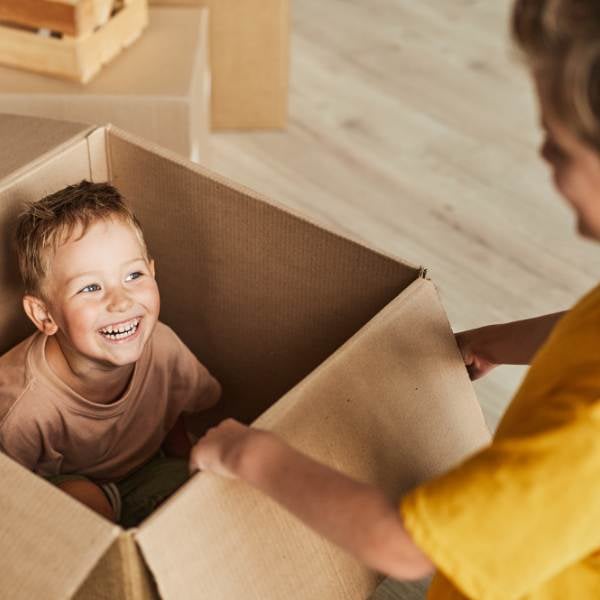Before packing, check this list of items prohibited from entering a particular country or region.
Key takeaways
- Moving tips for families include setting aside time to explain to your child why you're relocating and what it involves, hosting a going-away party for their friends, giving kids an activity to keep them occupied during the move and hiring a trusted international removals company to take the stress out of shipping.
- Things to consider when relocating your family include researching schools for your child in your new country, registering with a local doctor or paediatrician and exploring the area to assess the safety of the parks, playgrounds, and other kid-friendly facilities.
- The worst age to move a child is between 10 and 14, as at this stage, friendships inside and outside of school play a central role in their development, and leaving behind a familiar social circle is often overwhelming.

Moving abroad with children
Moving abroad with children is rarely straightforward. Alongside practical arrangements, you'll need to prioritise your children's wellbeing. Your kids will likely feel anxious about entering a foreign lifestyle and culture, and moving far from their friends and familiar surroundings.
Therefore, having open conversations as early as possible is essential. Prepare them with details about the new country, from food and climate to local customs and activities, to help spark their curiosity. As a result, they'll feel less fearful about the moving process.
Ahead of the move, connect with expat communities in your new country to gain invaluable tips and advice from people who have made the same move with children. You'll find communities online via Facebook, meetup.com, Reddit, expat.com, and more. From suggesting activities for kids and advising on culture shock, school applications and visa issues, such networks give your family a sense of belonging from the start.
Ensure the competent authority in the country where your child's birth certificate was issued has it officially apostilled, as some countries require this for school enrolment, visa applications, and other official procedures. Over 120 countries (including most of Europe, the US, Australia, India, and Japan) accept a birth certificate with an apostille as valid without further legalisation.
If possible, avoid selling your current home for at least six months after your move abroad. This allows your family to fully settle into their new surroundings whilst knowing there is a home to return to if things don't work out.
Prepare them with details about the new country, from food and climate to local customs and activities, to help spark their curiosity.
Moving to a new house with a toddler
Moving to a new house with a toddler is demanding, since young children crave routine and familiarity. The process can significantly disrupt daily patterns, leading to anxiety for your little ones.
Top tip: create a simple, fun song about moving to your new home and sing it with your toddler. It can build excitement and make the move feel like an adventure!
Talk your tot through each step as it happens so they feel included, and highlight the enjoyable changes awaiting them, such as a bigger garden or bedroom, local play parks, and new friends.
Ease the transition by sticking to consistent meals and sleep times, even during the move. Pack your toddlers' toys and most-loved belongings last and unpack them first to avoid frustration. Let them have their most cherished item during the move, such as a teddy bear or comfort blanket, to keep them calm and occupied.
Ask family or friends to watch your youngsters on moving day. A lot will be happening, and the upheaval could overwhelm them. This also gives you space to focus on managing a successful move.
Toddlers love nothing more than to explore. Let them gradually discover your new home, roaming from room to room once everything is unpacked. Patience is crucial, as children may take time to adapt fully. They'll soon adjust to their new surroundings with gentle reassurance, familiarity, and close attention to their needs.

10 moving tips for families
The best moving tips for families are to plan as early as possible, manage stress, let the kids feel involved, and work together as a team.
Here are our top 10 tips for relocating families:
1.
Set aside time to explain to your child why you're moving and what it involves, being as honest as possible. Reading age-appropriate books about moving* together is a fantastic way to help your children process the upheaval.
2.
Before the move, sketch the kids' new bedroom and let them interact with it. Suggest where their furniture or toys will go, and what colour they would like the walls painted.
3.
Create a memory box and fill it with photos, mementoes and handwritten memories so your child can cherish their old home, neighbourhood and friends.
4.
Give the kids an activity that keeps them occupied during the move, such as a portable video game, a colouring book, or TV shows on a tablet.
5.
To make the overseas relocation exciting, let your kids be involved before the move. Take them on house viewings, explore potential neighbourhoods, and let them visit their new school before starting.
6.
Give your children some responsibilities, such as letting them pack and unpack their own boxes or carry light items during the move.
7.
Have a going-away party so the kids can say goodbye to their friends and feel a sense of closure.
8.
Hire a trusted international removals company to ship your items, preferably one that specialises in secure self-loading moving pods and offers a door-to-door service to take the stress out of moving day.
9.
The best day to move is a Friday, giving yourself the whole weekend to settle in. Time the move during school holidays, ideally the summer break, to reduce disruption to your child's education.
10.
Explore the area together. Families who prepare, share responsibilities and support each other often find the moving experience more enjoyable.
*Seven Seas Worldwide does not endorse these products
How does moving affect a child?
Moving can affect a child emotionally, developmentally, and socially. Children may experience a sense of loss and uncertainty, which can appear as mood swings, irritability, or withdrawal. Disrupting familiar routines is often temporarily unsettling, even when a move abroad is positive.
They may temporarily struggle with confidence while adjusting to new friendships, cultures, languages, and routines. Acclimatising to a new school curriculum can also challenge their learning pace and expectations.
However, these experiences can help them develop resilience, adaptability, and increased empathy. And, with support and encouragement, children adapt and emerge stronger and more independent.

For a smooth transition, take time to understand how your child's current curriculum aligns with the new one...
Things to consider when relocating your family
Start by researching schools in your new country as soon as possible to understand the application process and requirements, including eligibility, language requirements, necessary documentation, entrance exams, interviews, tuition fees, and waiting lists. It's also an opportunity to compare multiple schools to ensure the best fit for your child's future.
For a smooth transition, take time to understand how your child's current curriculum aligns with the new one and how exams or qualifications may transfer. If needed, consider language tutoring.
Look into how your kids will travel to school and their activities, whether it's public transport, walking routes, or school buses. Consider whether they are old enough to travel independently or will need support. Also, register with a local doctor or paediatrician to transfer medical records, vaccination history, and prescriptions.
Explore the new neighbourhood to assess the safety of the parks, playgrounds, and other child-friendly facilities. Finally, note the local police and fire station numbers and the address of the nearest hospital and create a plan for emergencies or illness.
Worst age to move a child
The worst age to move a child varies, as it can be challenging for toddlers up to late teens. Certain ages, however, find it more difficult than others. Kids between 10 and 14 often experience the process of moving the hardest. At this stage, friendships inside and outside of school play a central role in their development, and leaving behind a familiar social circle is often overwhelming. Children around this age need as much support as possible while transitioning to young adulthood, balancing education, friendships, and self-discovery.
Parents and guardians can support their kids in several ways:
- Maintain communication: allow kids to openly express their worries, hopes, and fears about the move.
- Keep your kids updated: let them know what's happening and allow them to influence decisions about their new home or school.
- Help them stay in touch with old friends: encourage contact via emails, letters, phone calls, online games, and video chats.
- Motivate them to meet their peers: suggest activities and projects in the local community where they can casually make new friends.
- Maintain routines: keeping familiar daily schedules around meals, homework, and bedtime provides stability.
- Offer reassurance: remind them that it's normal to feel nervous or sad and that you're there to support them.











